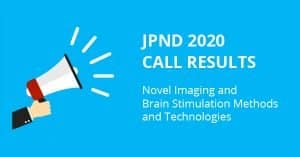
The EU Joint Programme on Neurodegenerative Disease Research (JPND) has awarded funding to twelve multi-national research teams in order to enable research projects on Novel Imaging and Brain Stimulation Methods and Technologies, that may in time bring about the delivery of targeted and timely prevention and therapies for patients of neurodegenerative diseases.
Major increases in the range and power of technologies across the basic, clinical and patient-centred domains of JPND have been seen in recent years. These include the use of imaging and analysis technologies, from Magnetic Resonance Imaging (MRI) to Position Emission Tomography (PET) to Molecular Imaging at both a molecular and a whole body imaging level, and the use of brain stimulation techniques such as Deep Brain Stimulation (DBS), Neuromodulation and Transcranial Magnetic Stimulation (TMS). Whilst techniques as such help to better understand, treat or diagnose neurodegenerative diseases, there is a need to assess the potential of these approaches to deliver new and better treatment options for these debilitating diseases.
JPND has selected twelve teams with ambitious, innovative, multinational and multidisciplinary collaborative research projects aimed at the development of novel and the advanced use of existing cutting-edge imaging and brain stimulation technologies related to neurodegenerative diseases.
“The incredible progresses of brain imaging and brain stimulation during the last ten years, thanks to the development of new technologies, bioinformatics and artificial intelligence, offers new opportunities to better diagnose and alleviate the consequences of neurodegenerative diseases”, says Professor Philippe Amouyel, Chair of JPND. “Twelve ambitious and innovative research projects that will take stock of these new approaches to deliver new and better treatment options have been selected and will be supported by JPND.”
The twelve projects were recommended for funding* by an independent, international Peer Review Panel based on scientific excellence with input from the JPND advisory board on patient and public involvement. Proposals are presented in alphabetical order according to their acronym.
Visit the call results page here.
BioClotAD
Development of a neuroimaging biomarker to identify the pro-coagulant state in Alzheimer’s disease
Coordinator:
Marta Cortes-Canteli, Centro Nacional de Investigaciones Cardiovasculares Carlos III, F.S.P., Spain
Partners:
Manuel Desco Menéndez, Hospital General Gregorio Marañón, Spain
Dag Sehlin, Uppsala University, Sweden
Susanne Kossatz, Klinikum rechts der Isar der Technischen Universität München, Germany
Scientific Abstract
BRAINSTORM
gloBal RetinAl Imaging coNSorTium fOR alzheiMer’s disease
Coordinator:
Peter van Wijngaarden, Centre for Eye Research Australia, Australia
Partners:
Ingeborg Stalmans, KU Leuven University, Belgium
Gauti Johannesson, Umeå University, Sweden
Scientific Abstract
DEBBIE
Developing a non-invasive biomarker for early BBB breakdown in Alzheimer’s disease
Coordinator:
Matthias Günther, Fraunhofer Gesellschaft, Germany
Partners:
Eric Achten, Ghent University, Belgium
Henri J.M.M. Mutsaerts, Amsterdam University Medical Center, Netherlands
Udunna Anazodo, Lawson Health Research Institute, Canada
Tormod Fladby, Akershus University Hospital, Norway
Scientific Abstract
DynaSti
Patient-specific dynamical modeling and optimization of Deep Brain Stimulation
Coordinator:
Andreas Horn, Charité – University Medicine Berlin, Germany
Partners:
Bernadette van Wijk, University of Amsterdam, Netherlands
Martijn Beudel, Amsterdam University Medical Centers, Netherlands
Jorge Goncalves, University of Luxembourg, Luxembourg
Alexander Medvedev, Uppsala University, Sweden
Dag Nyholm, Uppsala University Hospital, Sweden
Frank Hertel, Centre Hospitalier de Luxembourg, Luxembourg
Scientific Abstract
ImageTDP43
Imaging heterogeneous TDP-43 neuropathologies
Coordinator:
Magdalini Polymenidou, University of Zurich, Switzerland
Partners:
Patrizia Longone, Fondazione Santa Lucia, Italy
Ruben Smith, Skåne University Hospital, Sweden
John van Swieten, Erasmus Medical Center, Netherlands
NEURIPIDES
NEURofeedback for self-stImulation of the brain as therapy for ParkInson DisEaSe
Coordinator:
David Linden, Maastricht University, Netherlands
Partners:
Veerle Visser-Vandewalle, University of Cologne, Germany
Robert Jech, Charles University, Czech Republic
Béchir Jarraya, Université de Versailles-Paris-Saclay, France
Alfonso Fasano, University Health Network, Canada
Scientific Abstract
NIPARK
Targeting neuromelanin-linked neuronal dysfunction and degeneration in ageing and Parkinson’s disease using a combined imaging and brain stimulation approach
Coordinator:
Miquel Vila, Vall d’Hebron Research Institute, Spain
Partners:
Stephane Lehericy, Institut du Cerveau et de la Moelle épinière, France
Matthias Prigge, Leibniz-Institut für Neurobiologie, Germany
Matthew Betts, Deutsches Zentrum für Neurodegenerative Erkrankungen, Germany
Scientific Abstract
NeuroPhage
Phage-based targeted neural stimulation in neurodegenerative diseases
Coordinator:
Fabio Benfenati, Istituto di Ricovero e Cura a Carattere Scientifico, Italy
Partners:
Kenneth Dawson, University College Dublin, Ireland
Kristof Zarschler, Helmholtz-Zentrum Dresden-Rossendorf, Germany
Ludek Šefc, Charles University, Czech Republic
Gilberto Fisone, Karolinska Institutet, Sweden
Jean-Antoine Girault, INSERM, France
Scientific Abstract
PDWALK
Spinal-cord stimulation technologies and methods to alleviate gait deficits of Parkinson’s disease
Coordinator:
Grégoire Courtine, Swiss Federal Institute of Technology Lausanne, Switzerland
Partners:
Jocelyne Bloch, University Hospital of Lausanne, Switzerland
Erwan Bezard, CNRS, France
Vincent Delattre, Gtx Medical BV, Netherlands
Scientific Abstract
PETABC
PET analyses of ABC transporter function for diagnostics and stratification of dementia patients
Coordinator:
Jens Pahnke, University of Oslo, Norway
Partners:
Oliver Langer, Medical University Vienna, Austria
Peter Brust, Helmholtz-Zentrum Dresden-Rossendorf, Germany
Baiba Jansone, Univiersity of Latvia, Latvia
Ondrej Soukup, University Hospital Hradec Králové, Czech Republic
Fabien Gosselet, Universite d’Artois, France
Henrik Biverstål, Karolinska Institutet, Sweden
Scientific Abstract
REMOPD
Restoring Motor Functions in Parkinson’s Disease with Noninvasive Hybrid Transcranial Neuromodulation
Coordinator:
Saak V. Ovsepian, National Institute of Mental Health, Czech Republic
Partners:
Robert Chen, University of Toronto, Canada
Marc Fournelle, Fraunhofer Gesellschaft, Germany
Nevzat G. Gençer, Middle East Technical University, Turkey
Walter Paulus, Ludwig Maximillians Universität München, Germany
Toygan Sönmez, Alvimedica Medical Technologies, Turkey
Scientific Abstract
SCAIFIELD
Spinocerebellar ataxias: Advanced imaging with ultra-high field MRI
Coordinator:
Tony Stöcker, Deutsches Zentrum für Neurodegenerative Erkrankungen, Germany
Partners:
Pål Erik Goa, Norwegian University of Science and Technology, Norway
Pierre Maquet, Liège Université, Belgium
Thomas Klockgether, Deutsches Zentrum für Neurodegenerative Erkrankungen, Germany
Scientifc Abstract
* Please note this is a provisional decision. The final approval from national funding agencies is still ongoing.



